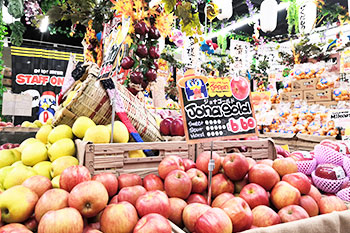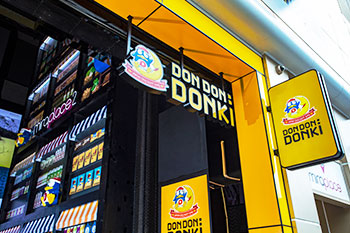
- HOME
- Corporate Information
- Introduction of the Founder
Introduction of the Founder
Message from the Founder
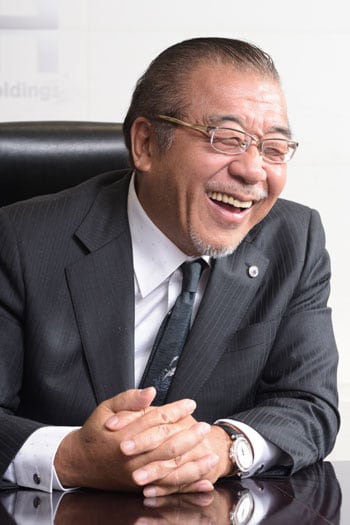
Founder
Takao Yasuda
Takao Yasuda
Japanese food could become Japan's second automobile industry
Japan is presently experiencing what can be called a historic depreciation of the yen. It is expected that the yen will remain ultra-cheap for some time due to various circumstances. Needless to say, the sharp depreciation of the yen is causing raw materials and import prices to soar, which is a major negative factor for many industries and markets in Japan. On the other hand, we are proud to be one of the few corporate groups that have the advantage of being able to turn the yen's depreciation into a benefit.
The first reason for this is the return of the inbound tourism business boom, which is one of our strengths. In October 2022, restrictions on entry to Japan for foreign visitors were eased, and in the near future, China's zero-COVID policy is expected to be lifted. As such restrictions are further eased and lifted, there will almost certainly be an explosive inbound tourism boom that surpasses tourism before COVID-19. The weak yen will of course be a strong tailwind for this boom.
Meanwhile, the export of Japanese food is another segment that will of course directly reap the benefits of the yen's depreciation. As is well known, the export value of Japanese agriculture, forestry, and fishery products as well as food products exceeded one trillion yen in 2021. The quality and deliciousness of Japan's products are highly appreciated overseas. The Government of Japan has a plan to raise this figure to five trillion yen by 2030. But from my experience as a distributor of Japanese products (overseas), I believe that the hidden medium- to long-term potential of Japanese food is at least several times that amount. In this sense, I believe that Japanese food products could even become Japan's second automobile industry. My conclusion is that we at the PPIH Group are taking the lead in establishing a position and infrastructure as the main player in proposing and promoting overseas sales of Japanese foods.
The first of its kind overseas! Launch of a completely original business format
Our overseas business expansion began with the acquisition of three Daiei Hawaii stores in Hawaii in the United States in 2006. Since then, we have been developing our overseas stores mainly through mergers and acquisitions (M&A) of existing local supermarket companies, including the Japanese supermarket chain Marukai, the local Hawaiian chain QSI, and the luxury Californian supermarket chain Gelson's. Meanwhile, DON DON DONKI, which opened in December 2017 on Orchard Road, Singapore's busiest shopping street, is the first completely original overseas business format we have developed from scratch. For me, DON DON DONKI is the commemorative first store of my "Second Founding" following Don Quijote in Japan. DON DON DONKI is a Japan-brand specialty store that specializes in Japanese products, mainly foods, and operates at reduced costs through our company's direct trading. It caused a sudden drop in the prices of Japanese products, which made it a sensation in the local media and on social media as an extremely prosperous store right when it opened.
Restaurant & retail: A third business format that will create a new market
I would also like to draw your attention to the fact that DON DON DONKI has been used as an incubator to create new, unique business formats, which could be called spin-offs, one after another. All of these business formats are thriving and playing a role or two in promoting sales of Japanese food, as I mentioned earlier. For example, the first Sen Sen Sushi opened in Hong Kong in October 2021 and has become a very popular local establishment. Sen Sen Sushi already has three outlets in Hong Kong (as of June 30, 2022), and we intend to rapidly increase the number of locations in other countries going forward. There is an extremely high number of Japanese restaurants and Japanese food stores in Hong Kong. Of course, well-known Japanese conveyor-belt sushi chains have already entered the market, making the competition in this industry in a sense even more intense than in Japan. In this context, why has Sen Sen Sushi, which is produced by the restaurant industry outsider DON DON DONKI, garnered such popularity and support from local customers? Of course, the main reason is that customers can enjoy delicious sushi made with the best selection of authentic Japanese ingredients and rice at reasonable prices. This is the most important point. But why exactly is that possible at Sen Sen Sushi? The answer is that the infrastructure of the DON DON DONKI product sales chain and the global supply chain network that supports it are already well established. This means that for us, the sushi we pack and sell in our side dish areas and the sushi we serve to customers on plates are almost identical, with only slight differences in the final process and operations. As a result, Sen Sen Sushi has created a new market as a third type of business format known as "restaurant & retail," which is neither mere retail sales nor a restaurant, and has caused a distribution revolution that only we could accomplish.
Placing utmost importance on the concept of "creative jumps"
I would like to raise one more example of a new business format derived from DON DON DONKI. Tomita Seimai, which opened in Singapore in November 2021, and Yasuda Seimai, which opened in Hong Kong in June 2022, are also popular, prosperous shops that sell onigiri rice balls based on a completely new concept. Most non-Japanese customers cannot understand the quality and actual taste of Japanese rice simply by looking at the shop. Therefore, the rice-milling shops began selling onigiri so that customers can experience the taste of the rice. This caught the attention of many customers who wanted to learn more, making the shops instantly popular. Of course, what we ultimately want to gain favor for among customers at these shops is the milled rice itself. To that end, we want as many customers as possible to discover the taste of Japanese rice through our onigiri. Although there are many stores overseas that sell Japanese rice balls, our business format is most likely the first "onigiri shop" that also sells freshly milled rice in the world. It was popular beyond expectations because of its experience-oriented business format that sells products while showing the "why" and "because" of the deliciousness of the products to customers. Rather than being a mere retail store or restaurant, it can also be called a "third type of business format." In other words, the entrance is a restaurant business format where customers can enjoy freshly made delicious onigiri, and the exit is a retail business format where customers can buy authentic Japanese rice. I believe that this is a hybrid, or perhaps I can say borderless, business format that cannot be found anywhere else in the world.
We do not believe at all that simply taking Japanese products overseas will make them popular among locals. On the contrary, we are always aware that the products will become explosively popular only when there are unique proposals, ingenuity, explanations, and innovations to garner support from customers. We place utmost priority on taking "creative jumps" in creating new business formats in these ways.
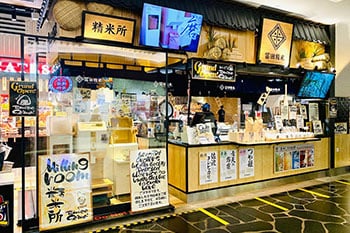
Expanding across all of the U.S. and the Pacific Rim as a purveyor of Japanese food
The development of new business formats that can simultaneously sell the excellence of high-quality Japanese ingredients and the taste itself is not limited to rice, but can also be applied to a wide variety of Japanese food ingredients. For example, at DON DON DONKI in Malaysia, our wagyu beef skewers, which are prepared and eaten on the spot, enjoy tremendous support, with customers waiting in long lines to try them. As in the case of Sen Sen Sushi mentioned earlier, the success and establishment of this wagyu beef skewer take-out business directly leads to a virtuous cycle of reducing waste loss through the sale of wagyu beef by DON DON DONKI, and maintaining freshness and prices as a result. In other words, it can be called a win-win business where customers, our stores, Japanese producers and distributors, as well as society and the nation, are all happy. As a purveyor of Japanese food, we intend to expand not only across the ASEAN region, but also all of the United States and the Pacific Rim.
We look forward to the continued support of our customers, partners, and all other stakeholders.
Takao Yasuda
Born in Gifu Prefecture in 1949. Graduated from the Faculty of Law, Keio University in 1973.
In 1978, Takao Yasuda opened and successfully ran a 60 m2 discount store in Tokyo's Suginami Ward. After five years, however, he sold the store and began operating a cash-and-carry wholesale store. Although this new endeavor also yielded significant profits, Yasuda decided to reenter the retail market, opening the first Don Quijote in Tokyo's Fuchu City in 1989. As President and Representative Director, he oversaw the nationwide expansion of Don Quijote Co., Ltd., (now Pan Pacific International Holdings Corporation (PPIH)), before assuming the position of Chairman, CEO and Representative Director in 2005.
PPIH enjoyed rapid growth while overcoming numerous challenges. In 1996, it registered stock for trading on the over-the-counter market and in 2000, the company's stock was listed on the First Section of the Tokyo Stock Exchange. Since the opening of the first Don Quijote store, PPIH has achieved 35 consecutive years of increased sales and profits. For the fiscal year ended June 30, 2024, the company recorded net sales of 2,095.1 billion yen and had 742 group stores in Japan and overseas.
In June 2015, Yasuda stepped down as Chairman, CEO and Representative Director of PPIH and assumed the position of Founding Chairman and Supreme Advisor. At the same time, he shifted his base of operations to Singapore, founding DON DON DONKI based on the concept of a Japan-brand specialty store, and serving as Chairman, President and CEO of Pan Pacific Retail Management (Asia) Pte. Ltd.
As of June 2024, there are 45 DON DON DONKI stores in 6 countries and regions, with each store enjoying success and immense popularity among the locals.
In addition, Yasuda established the Yasuda Scholarship Foundation in 2005. Serving as its Chairman, Yasuda is engaged in a wide range of initiatives, including the development of international human resources and international friendship and goodwill projects.
Our Origin Story
Takao Yasuda, the founder of the PPIH Group, is a man of unparalleled passion in his pursuit of business. He has persistently stood alone, going against the trend and vowing to never imitate other major retailers, with the customer mattering most at all times. This founding spirit and its hallowed values have been passed down to the next generation, now at the core of today's PPIH Group.
The Founding Spirit
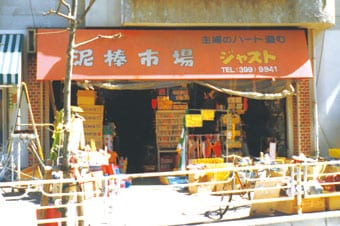
The progenitor of the PPIH Group was a single, 60 m2 sundries shop called Thieves' Market, established in 1978 in Tokyo's Suginami Ward by Group founder Yasuda. This enterprise began with no retail experience, no ingrained expertise, and no established network. With convenience stores open only until 11pm, this miscellaneous goods store, which was open until midnight and looked like a toy box flipped over, quickly gained popularity, earning annual sales of 200 million yen.
The beneficiary of the expertise built from the Thieves' Market was the very first Don Quijote location, opened in March of 1989. This would be the launching pad for a greater expansion of the group. Since our founding, we have continued to leverage the unconventional in our innovation, an immutable core trait of our DNA even today.
![[Discovering Demand for Late-night Shopping][Crafting a Unique Shopping Space][Trust, and Entrustment: The Beginnings of the Art of Delegating Authority]](/en/corp/founder/img/en_founder_img_02_02.jpg)
The Secret Story of the Birth of DON DON DONKI
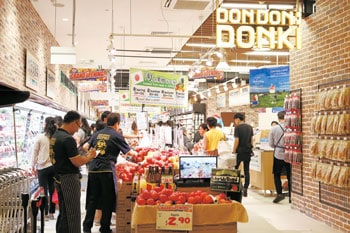
When he decided to take on the challenge of expanding the Group's footprint into overseas markets, Yasuda felt that making the same Don Quijote that existed in Japan would be meaningless. Here, he discovered the benefits of Japanese cuisine. In Singapore, Japanese food was very popular with locals, and would sell for two to four times the price it would domestically.
This was locally called the harmony price (where the intermediate distributors profited), and was accepted as a foregone conclusion. At the time, Yasuda was upset about this; "How dare they neglect the customer this much?" This was because of our completely opposing company principle that the customer matters most.
Further, resolving this issue would also support those producing Japanese food items. Most importantly, not only were the families of Japanese expatriates working locally at Japanese firms pleased, but so were local Singaporean consumers, resulting in a boost to Japan's image. Yasuda believed he was uniquely suited to provide this social contribution with his many years of retail experience, sensing this may be his calling, or even fate.
Today, the Group has rigorously implemented a system that puts the local business area first, tailoring all policies to that area. Further, we place the highest emphasis on creative destruction, without reliance on the success stories of the past. When building our business framework based on these principles, our overseas stores' product composition ended up being entirely different than that of our domestic stores, almost entirely without any industrial products and with a focus on food items.
This is how the DON DON DONKI brand was born and came to be loved by local consumers.
- Related Contents
-
Number of stores by country and region by group business type


